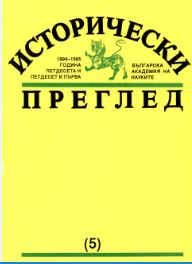Любен Каравелов и Христо Георгиев (Каравеловата повест „Хаджи Ничо“ като исторически извор и политически диспут)
Lyben Karavelov and Hristo Georgiev (Karavelov’s Short Novel “Hadji Nicho” as a Historical Sourceand Political Dispute)
Author(s): Krumka SharovaSubject(s): History, Cultural history, Political history, Modern Age, 19th Century, The Ottoman Empire
Published by: Институт за исторически изследвания - Българска академия на науките
Summary/Abstract: L. Karavelov published his short novel “Hadji Nicho” in the summer and autumn of 1870 first in the newspaper “Svoboda” and then in a separate book. The prototype of the main hero Hadji Nicho, a wealthy Bucharest merchant, was Hristo Georgiev, the leader of the Virtuous Company. The work is written in a parfocal tone and aims at presenting to the Bulgarian emigration the dark side of a prosperous merchant, banker and political leader. It was based in its larger part on true facts, in some places exaggerated by the author, but basically trustworthy. The Bulgarian Revolutionary Central Committee, founded in the autumn of 1869, was at that time locked in a fierce political struggle with the “old” on the principal issued of the Bulgarian liberation movement: the road to freedom. L. Karavelov, V. Levski and the adherent of the Bulgarian Revolutionary Central Committee regarded as wrong the pro-Russian orientation of the Virtuous Company, implemented above all H. Georgiev. For this reason the second chief person in the short novel is the Russian consul in Bucharest with the features of the real life diplomat H.H. Ofenberg who supported the “old” and interfered in the political relations of the Bulgarians from such positions. Through the character and conduct of Hadji Nicho (H. Georgiev) Karavelov revealed the stand of Virtuous Company, harmful to the Bulgarian liberation movement, of his direct adherence to the Russian Balkan policy and his subjection to it. The short novel “Hadji Nicho” reveals also, through the case of the protagonist, the genesis of the Bulgarian big bourgeoisie, the speculations it resorted to in its irrepressible greed for wealth, including the use of sums from endowments left by patriotic Bulgarians for national goals. Indicated are also the way and episodes where Hadji Nicho as its generalized image, exploits his ties with the Russian Government for enrichment during the Crimean War and afterwards. Another source utilized by Hadji Nicho were the sums bequeathed by patriotics emigrants for national purposes. Most of the facts narrated by L. Karavelov in the short novel find confirmation in the sources – documents and memoirs. It may be considered therefore as an additional source on H. Georgiev and the Virtuous Company. Its chief purpose was closely connected with the relations between “young” and “old” in the emigration in Romania. Their different political position along the freedom and the struggle of the Bulgarian Revolutionary Central Committee for independence of the Bulgarian liberation movement, against Russia’s intervention in it and chiefly against its subjection to her policy, a position followed by H. Georgiev and the Virtuous Company. In this was the short novel “Hadji Nicho” is not only a parodic portrait of the leading personality of the big-bourgeoisie pro-Russian grouping, H. Georgiev, but also a political dispute against the political line of this grouping. This is attested also by the fact that almost at the same time Karavelov drew up and published the two programmed documents of the Bulgaria Revolutionary Central Committee (BRCC) “Programmed of the Bulgarian Revolutionary Committee” and “Bulgarski glass. Ot BRTsK” (Bulgarian Voice from the BRCC), where he substantiated the political platform of the Bulgarian revolutionary party. There, especially in “Bulgarski glass” he touched on main question of the struggle for freedom, in the first place – the need for independent struggle, without illusory hopes in the Great Powers, Russia included. In the same spirit was the protest statement which Karavelov directed to the Russian Ambassador in Constantinople N.P. Ignatiev against the interference of the Russian Consul in Bucharest Ofenberg in the Bulgarian Liberation movement and his union with the “old”. This is the same theme which sounds in “Hadji Nicho” presented with the main protagonist; Hadji Nicho and the generalized image of the Russian Consul with the features of Ofenberg. The place of the short novel in the artistic work is outside the attention of the authoress. An analysis made of its political meaning and its significance in the political struggle between “young” and “old” and its significance as an important and strongly acting element of the efforts of BRCC to defend the revolution as a road to freedom and the morals to which should adhere the National Revival patriots facing the colossal task of defending Bulgarians free and independent development.
Journal: Исторически преглед
- Issue Year: 1995
- Issue No: 5
- Page Range: 3-33
- Page Count: 31
- Language: Bulgarian
- Content File-PDF

